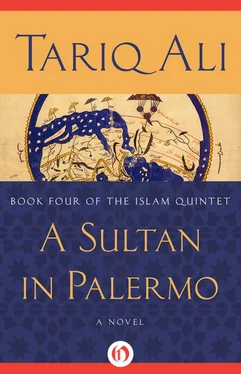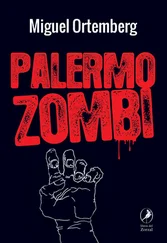Even a year ago the thought of living anywhere else would have been laughable. History had changed everything. Rujari and Philip. The two men he had felt closest to in the palace. Not just history. Mayya and Elinore and Balkis.
Who could have predicted what had happened? Not Allah. Then he wondered: if Philip were alive and Rujari dead would he have felt the same way about Palermo? He had said no to William, but if Philip had insisted that he could be of vital service to the state, would he have been able to decline so swiftly, if at all? Who would have won the tug of war for his services? Philip or Balkis? History could only be the result of a disordered imagination.
Massacre in Palermo. Idrisi decides never to visit the city again. He leaves for Baghdad.
HE KNEW SOMETHING WAS wrong the minute he entered the palace in Siracusa. When the guard saw him at the gate, he had signalled the doorman and sad faces kept turning away from him as a gloomy-faced Chamberlain led him to the Amir’s private chamber.
I hope nothing has happened to Balkis he thought to himself over and over again. He entered the Amir’s chamber to find Balkis there, her eyes red from crying. It was the sight of Abu Fityan that astonished him. The man fell on his knees and rested his head on Idrisi’s feet.
‘Forgive me, Ibn Muhammad. Forgive me.’
‘Will someone tell me what’s happened. Mayya?’
Balkis nodded.
‘Dead? Why?’ He wept loudly.
‘Afdal?’
‘Is safe here with us and fast asleep.’
‘Allah be praised. Ibn Fityan, stop weeping and tell me what happened.’
But tears continued to flow. After some time the story began to unfold, interrupted by weeping and questioning from those present. It emerged that what had taken place was a revenge killing.
The Baron from Messina wanted to know why the young Sultan had ordered him not to take any hostages from Palermo. The Sultan explained that this was unacceptable behaviour and that Master Idrisi had warned it could provoke an explosive response. The baron had bowed and left. This much was reported to Ibn Fityan by the palace eunuchs who overheard the exchange. The mood of the city was tense. There had been another brawl and both sides were hurling abuse at each other. Two days later, Mayya felt that Afdal, who was recovering from a fever, might benefit from the sea air. She asked Thawdor and Ibn Fityan to accompany the child and the maid to the shore.
‘When I returned, Master, there was blood on the stairs and my heart began to race. I rushed in and saw the bodies of the servants littered on the floor. They had been disembowelled and their throats were slit. There was only one survivor. He was in your room and hid underneath the bed. The Lady Mayya had been dishonoured and killed.’
Idrisi and Balkis, ignoring Ibn Fityan’s presence, comforted each other, wiping the tears from each other’s cheeks.
‘What has happened Balkis? Why? I should have insisted she come here. I should have forced her. My poor Mayya. Why her? Why not me? It was me they were after. How will I face Elinore? You must go and tell her, Balkis. Yes, yes, Ibn Fityan, finish your story. Don’t weep, man. I’m glad you’re alive. Otherwise they would have killed Afdal and Thawdor and you. How could you have saved them? You would have been killed like the rest. It was not your fault. There is no reason to feel guilty.’
Ibn Fityan wiped his tears and continued. ‘The boy who survived told me the men were in their cups, shouting obscenities and destroying everything. Some of your books were thrown out of the window. The rest were on the floor where these animals defecated and urinated on them.’
Idrisi’s sadness was mixed with rage.
‘Is there no limit to these barbarians?’
‘The whole city is stunned by the crime, Ibn Muhammad. The Sultan has ordered the arrest of the Baron from Messina. He wants the Baron and the Lombard hirelings to be publicly executed. The English Bishop is advising caution.’
Idrisi recalled the Englishman, middle-aged with light brown eyes and thinning hair, intelligent, ruthless and with a mocking, unpleasant, rasping voice, but also with an unlimited capacity to flatter those in power or close to it. Most courts have them, but this Bishop was unique. Rujari had never liked or trusted him, often remarking that the man was in the pay of the Vatican.
‘He is an evil one. Monks never advise caution when it’s a question of killing our people.’
Ibn Fityan shook his head sadly.
‘The Sultan sends his condolences and wishes you to return to Palermo.’
‘I will not return. I do not wish to see that house again.’
‘A wise decision.’
‘Where is Thawdor?’
‘He is here. He wished to see his son and, like me, he cannot bear the sight of Palermo or the house. I brought the maid as well since Afdal ibn Muhammad is used to her presence.’
‘You were wise to bring him here. Both of you can accompany me back to the estate. Perhaps Afdal…’
‘Leave him here,’ said Balkis. ‘There will be time later. Elinore needs you and there must be no distractions.’
‘Ibn Fityan, it would be helpful if you and Thawdor remained on the estate. He can bring his wife as well.’
‘I will do as you suggest, master.’
After Ibn Fityan had left the room, Balkis drew Idrisi to her, resting his head on her lap, and combed his hair with her fingers.
‘It is unbearable, Balkis, that she should be punished in my stead. It’s unbearable. And those animals raped and humiliated her. My son Uthman would reprimand me for referring to them as animals. He thinks humans are much worse.’
‘Uthman? Your son? You never spoke of him before now.’
‘Humans have this capacity to shield themselves from unpalatable truths. I am ashamed I never spoke of Uthman. He was so happy to see Elinore that he demanded I tell him all about Mayya.’
‘I want to know all about Uthman.’
To distract them both from their grief, he described Uthman’s history to her in detail, how he found it easier to relate to animals or young humans like Khalid than to the human race. Balkis determined to take his new brothers to see him. But now Idrisi knew he must leave again for his estate to give Elinore the terrible news of her mother’s death. Before his departure he wanted to see Afdal. Balkis took him by the arm to the chamber where the boy slept.
He wept again as he saw his sleeping son, not yet six months old. Who could love him like his mother once did? She almost read his thoughts.
‘I have enough milk for both of them,’ she told him. ‘I will bring him up like my own son.’
‘Perhaps in a few months’ time I should take him to the estate. Let me speak with Elinore.’
As they left the chamber, they saw the Amir who greeted Idrisi with a warm embrace.
‘Allah have mercy on us, Ibn Muhammad.’
‘Nobody else does,’ replied the scholar.
Some hours after he had left, Balkis was feeding both children and noticed that Afdal kept pushing her nipple aside before groping for it again, while Hamdis stuck to it like an insect. Perhaps my milk tastes different and he has noticed. But Eudoxia, the maid who had survived the massacre, reassured Balkis. ‘He’s like that with every tit, my lady, if you’ll pardon my speech. Your sister — may the Lord bless her — was always struggling to feed him. He’s a strong one, this lad, and will give women a lot of trouble, bless him.’
‘Do you go to church every Sunday?’
‘Yes, my lady.’
‘Do you think those barbarians who killed my sister and the servants would have spared you if they’d seen the crucifix hanging from your neck?’
‘Oh no, my lady. Two of the girls who were killed had the same cross around their necks. They were animals, my lady, only worse. Lombards! They weren’t from this island. Our people…’
Читать дальше












